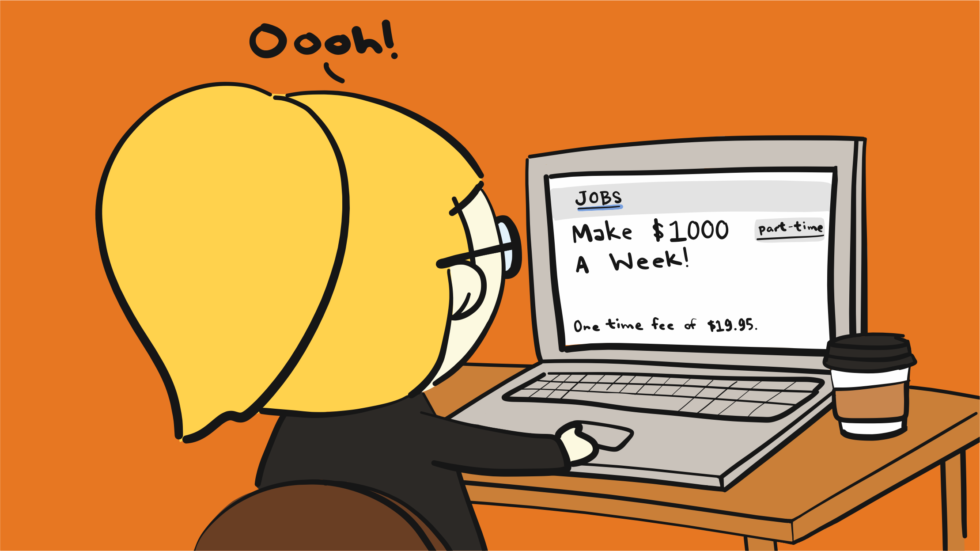5 Ways to Stand Out From the Crowd Even if You May Not Be the Obvious Choice—With Examples
You’re searching for a new job, when suddenly you find “the one.” The job you just know you’d love. There’s only one small catch: you’re not exactly qualified for it.
Whether it’s the years of experience or a particular desirable skill that is listed, there’s at least one piece of the puzzle that makes you think you are underqualified. Generally, at this point, you’d close your laptop, sigh deeply, and then move on with your life, but the job just seems too great. You need to at least give it your best shot and apply.
When it comes to your resume, there are a few things you can do, like rearrange it to be a skills-based resume that focuses on your most relevant skills and experience rather than a chronological retelling of your roles. (You can find a skills-based resume template here.) Your cover letter is a different story.
Generally, especially when submitting a resume online, there is no need for a cover letter unless it is specifically requested. But if are going going to write one—because it has been requested, you know someone who can pass it along, or you are sending it directly to the hiring manager—it’s a great opportunity to share a little bit more of your journey, explain why you want this position, and convince the hiring manager that despite appearances, you’re actually a perfect fit for the job.
Doing all of that when you already feel a little unfit for the gig can definitely be a challenge. But don’t panic! Here’s what you need to know about your cover letter when you’re applying for a job that seems a little out of reach.
1. Analyze Your Expectations
Be honest with yourself about whether attempting to get this job is realistic.
Alright, first things first, it’s time to get real. It’s great to look around and expand outside of your comfort zone and throw your hat into the ring for opportunities that seem like a (reasonable) stretch. However, it’s not the best use of your time to write a cover letter for a job you are not qualified for.
So, before even opening up a new document and attempting to crank out the perfect cover letter, you need to be honest with yourself. Is this truly something you should be applying for or is it way outside the realm of possibility?
If we’re talking about a case where you’re a year or two short of the experience they’d like to have, then go for it! Maybe you consider yourself proficient in Excel but you’re not at that expert level they say they’re looking for. In the grand scheme of things, that’s not a huge deal.
But if it seems like the requirement is essential for the job, you may want to reconsider. For example, if the position is asking for a sales executive with seven to ten years of experience and you just graduated last May? You probably need a little more time to work your way up.
This step might be a little discouraging, but it’s important. After all, no amount of creative cover letter writing is going to be able to fill those major gaps.
2. Focus On Relevancy First
Start off by talking about the experience you do have, rather than what you lack.
When you’re already feeling a little self-conscious and underqualified, it can be tempting to start your cover letter off with something like, “I know I’m not at all what you’re looking for, but…” Read these words carefully: Do. Not. Do. That.
There’s absolutely no point in drawing attention to your flaws or lack of required experience right off the bat. Either the hiring manager will see that and move on, or they’ll be convinced to give you a shot based on the amazing cover letter you write. Calling out that you aren’t qualified can only hurt you. Instead, use that precious cover letter space to describe what you do bring to the table—by starting off with any relevant skills or experience you have.
Comb through the job description and highlight the keywords and attributes that you fulfill. Then, emphasize those in the early part of your cover letter. It helps you start off with a bang by presenting yourself as a relevant, qualified candidate—which is important for making your way to the top of the “to be interviewed” pile.
Example
If you are a florist and applying to a job post that includes keywords like “entrepreneurial,” “efficiency,” and “detail-oriented,” here is a sample of how you could open:
“After 3 years of running my own business, I am looking to join a team that encourages an entrepreneurial spirit while working together to solve large problems. I pride myself on the ability to look at processes and identifying how they could operate with more efficiency. I have found that the key is to be a detail-oriented person who takes the time to speak with all people involved, understand every step of a process, and then recommend new methods to save time and money.”
Also, it’s important to keep in mind that no employer really thinks they’ll find an applicant who checks every box. A job description’s requirements section is really more of a wishlist than a checklist. So, don’t get discouraged by focusing on all of the criteria you don’t meet. Instead, stay positive and draw attention to all of the positive qualities that make you a great fit.
3. Pull Out Key Accomplishments
Use numbers to show how you are able to achieve quantifiable results.
Here’s an eternal truth: being great at what you do always translates, even if you’re looking at a career shift to a completely different type of job. If you can show that you’re someone who puts their all into projects to achieve the best possible results, hiring managers are sure to be impressed. This is why it’s so important to consider specific, quantifiable achievements and write about them.
Example
No matter what the role is, numbers help support your case as someone who drives results. Some samples could look like this:
- Increased sales by 25% in one quarter
- Refined a process that streamlined efficiency and cut production time by five hours per week
- Organized a work event that raised $10,000 in donations for a local animal shelter
Whatever it is, make sure you include some hard accomplishments, backed up by numbers, in your cover letter. Remember—success and hard work are always transferable qualities.
4. Demonstrate Your Interest
Let your passion shine through.
There are people who will apply for any open position under the sun, no matter their qualifications. They desperately want a new job and will add their resume to the pile for any opportunity they can find—just for the sake of applying. But, guess what? Hiring managers can spot that type of candidate from a mile away.
You don’t want to be seen as one of those people. So, you need to adequately share your passion for, or interest in, this particular position.Think about how you would answer these questions: Why do you want this job? What attracted you to the position or the company?
Example
These samples show how you can communicate your knowledge of the industry and passion for the role:
- My love of the fashion industry goes back to my high school days when I would live tweet your brand’s shows. I’ll always be partial to the Spring 2017 Ready-To-Wear collection.
- I have 5 years of experience as a cybersecurity project manager facilitating communication between our engineers and sales team. As someone who has used your company’s industry-leading software, my ability to simplify technology concepts for non-engineers, would be a great asset for this client-facing role.
This is an essential piece of information to share in your cover letter. It emphasizes that—even if you don’t meet every single requirement—you’ll bring a strong passion and positive attitude to work every day. The great thing about that? It’s something that simply can’t be taught.
5. Finish Strong
Highlight how your different perspective and enthusiasm makes you someone they’ll want to meet with.
Ending your cover letter can present a new challenge. How do you wrap everything up and inspire the hiring manager to reach out for an interview? Conclude with a sentence that recognizes you’re bringing something a little different to the position—but that you’re confident you’ll still have a positive impact. Then include a strong call to action for the employer to reach out and set up a time to chat.
Example
Here is a sample of how you may want to conclude your cover letter:
“I look forward to talking with you about how my diverse skills and experience can benefit your organization.”
Nobody ever feels like they’re absolutely perfectly suited for a position that they’re applying for. But, when you feel particularly underqualified? Well, it’s a surefire way to walk into the hiring process with a bad attitude and a load of self-doubt.
Shake it off and use your cover letter to show what a qualified candidate you are! Use these tips, and you’re well on your way.


 by Admin
by Admin

